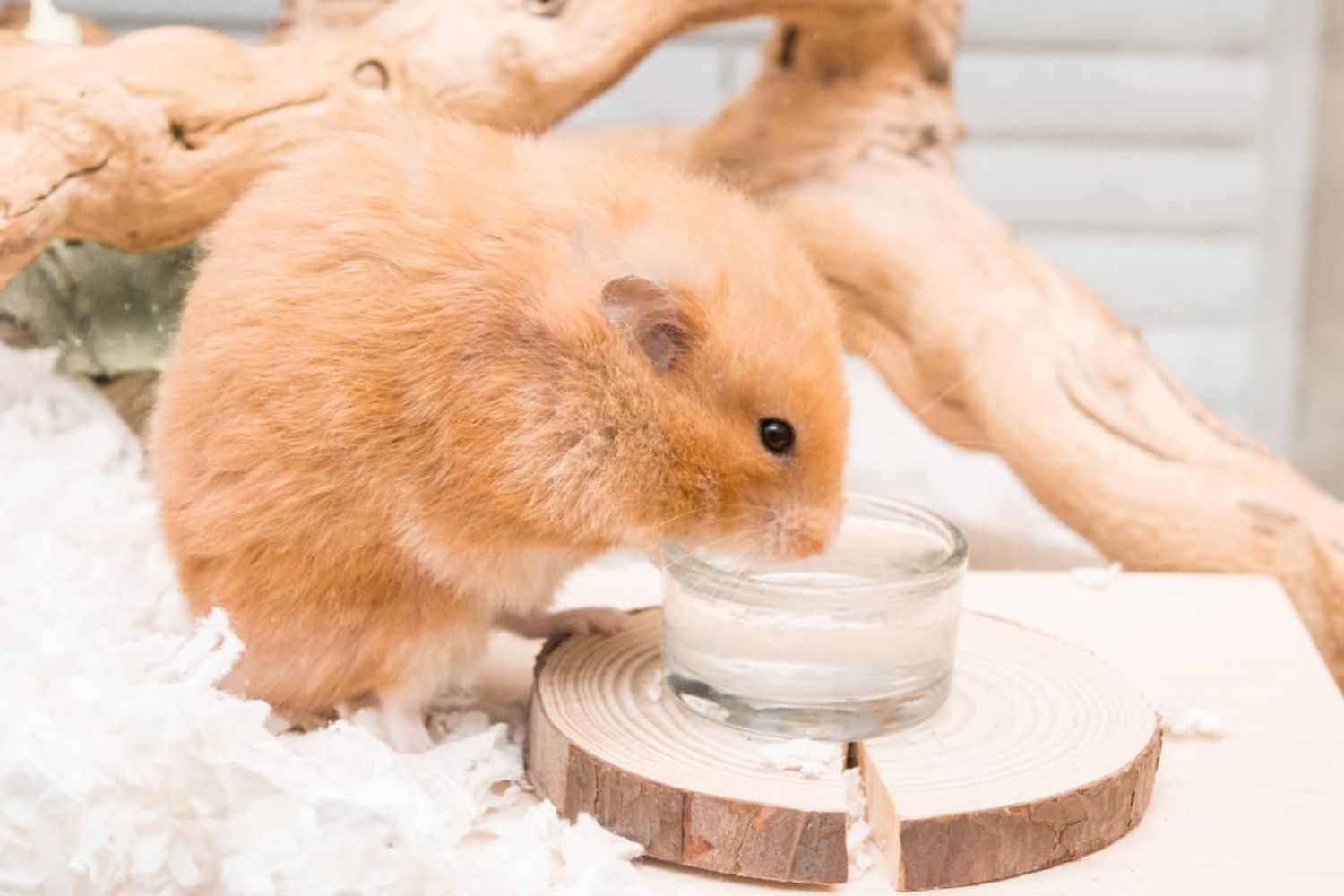- 1-Dirty Water Bottle
- 2- Stress or Anxiety
- 3- Illness, injury or Pain
- 4- Wrong Water Bottle Placement
- 5- Water Bottle Malfunction
- 6- Dietary Changes
- 7-Dehydration
- 8- Preference for Fresh Foods
- 9- Cold Temperatures
- 10- Your hamster is getting old
- What may happens if your hamster is not Drinking enough Water
- Encouraging Hydration in Hamsters
- Teaching Hamsters to Drink from Water Bottle
- Final Thoughts
- Frequently Asked Questions
If Your Hamster Is Not Drinking Water, the reason maybe illness, stress, discomfort, or some other enclosure issues. Ensure a clean and comfortable environment, offering fresh water regularly to encourage proper hydration. It’s crucial to monitor closely for signs of dehydration and consult a veterinarian if the behavior persists.
We’ll now explore the top 10 reasons why your hamster might be shying away from their water source. From environmental factors to health issues, we’ll dive into each potential cause and provide practical advice to ensure your hamster stays hydrated and healthy.

- 1-Dirty Water Bottle
- 2- Stress or Anxiety
- 3- Illness, injury or Pain
- 4- Wrong Water Bottle Placement
- 5- Water Bottle Malfunction
- 6- Dietary Changes
- 7-Dehydration
- 8- Preference for Fresh Foods
- 9- Cold Temperatures
- 10- Your hamster is getting old
- What may happens if your hamster is not Drinking enough Water
- Encouraging Hydration in Hamsters
- Teaching Hamsters to Drink from Water Bottle
- Final Thoughts
- Frequently Asked Questions
1-Dirty Water Bottle
A dirty water bottle can deter your hamster from drinking. Bacteria can quickly build up, affecting the taste and quality of the water. Ensure your hamster’s water bottle is cleaned regularly with mild soap and water, and rinse thoroughly to remove any soap residue. Refill with fresh, clean water daily to encourage your hamster to drink.
2- Stress or Anxiety
Hamsters are sensitive creatures and can easily become stressed or anxious, especially in noisy or unfamiliar environments. Stress can lead to a decreased appetite and reduced water intake. Create a calm and quiet space for your hamster, away from loud noises and disturbances. Provide plenty of hiding spots and enrichment activities to help alleviate stress and encourage drinking.
3- Illness, injury or Pain
Illness or pain can cause your hamster to avoid drinking water. Dental issues, such as overgrown teeth or tooth abscesses, can make it painful for your hamster to drink. Additionally, illnesses such as kidney disease or urinary tract infections can affect your hamster’s thirst levels. If you notice any changes in your hamster’s behavior or suspect they may be unwell, consult with a veterinarian promptly for a proper diagnosis and treatment plan.
4- Wrong Water Bottle Placement
The placement of your hamster’s water bottle can impact their ability to drink. Ensure the water bottle is securely attached to the cage and positioned at a comfortable height where your hamster can easily access it. Avoid placing the water bottle near the hamster’s bedding or food bowl to prevent contamination.
5- Water Bottle Malfunction
Check your hamster’s water bottle regularly for any signs of malfunction. Sometimes, the ball bearing or sipper tube may become stuck, preventing water flow. Clean the bottle and check for any blockages or damage that may be inhibiting water flow. If the bottle is damaged, replace it with a new one to ensure your hamster has access to fresh water.
6- Dietary Changes
Changes in your hamster’s usual diet can impact its water intake. Certain foods may contain more water than others, influencing your hamster’s overall hydration levels. If you’ve recently introduced new foods or treats to your hamster’s diet, monitor their water intake closely to ensure they are drinking enough. Provide fresh water daily to supplement their hydration needs.
7-Dehydration
Dehydration can occur if your hamster is not drinking enough water. Signs of dehydration include sunken eyes, dry skin, lethargy, and loss of appetite. If you suspect your hamster is dehydrated, offer water-rich foods such as cucumber or wetting their dry food with water to encourage hydration. If your hamster is severely dehydrated, consult with a veterinarian for immediate treatment.
8- Preference for Fresh Foods
Hamsters can obtain water from fresh fruits and vegetables. If your hamster prefers to eat fresh foods over drinking water from their bottle, ensure they have a balanced diet with plenty of water-rich foods. Offer a variety of fresh fruits and vegetables such as cucumber, lettuce, and apples to supplement their water intake.
9- Cold Temperatures
Cold temperatures can cause the water in your hamster’s bottle to freeze, making it inaccessible for drinking. Ensure your hamster’s cage is kept in a warm environment away from drafts or cold air. Use insulated water bottle covers or place a small heater near the cage to prevent the water from freezing during colder months.
10- Your hamster is getting old
As hamsters age, they may become less active and drink less water. Monitor your senior hamster’s water intake closely and provide additional hydration options if needed. Wetting their dry food with water or offering water-rich foods can help ensure they stay hydrated as they age.

What may happens if your hamster is not Drinking enough Water
Dehydration
Reduced water intake in hamsters leads to dehydration, manifesting in lethargy, dry mouth, and weight loss.
Organ Dysfunction
Insufficient water may affect your hamster’s vital organ functions, leading to urinary tract problems, liver dysfunction, and digestive disturbances.
Digestive Issues
Lack of water can cause constipation and intestinal blockages, posing serious health risks.
Susceptibility to Heat Stroke and Infections
Dehydration increases the risk of heat stroke and compromises the immune system, making hamsters susceptible to infections.
Overall Decline in Health
Prolonged dehydration negatively impacts energy levels, cognitive function, and overall vitality, diminishing hamsters’ quality of life.
Encouraging Hydration in Hamsters
Monitoring Water Intake
Regularly check water levels and observe hamsters’ behavior for any changes indicating dehydration.
Providing Water-rich Foods
Supplement regular diet with water-rich vegetables like zucchini or peach, but in moderation to avoid digestive issues.
Ensuring Accessibility of Water Containers
Consider alternative water containers if hamsters struggle with bottle drinkers, ensuring cleanliness and accessibility.
Seeking Veterinary Attention
Promptly consult a veterinarian if dehydration persists or if additional symptoms arise, ensuring proper diagnosis and treatment.
Teaching Hamsters to Drink from Water Bottle
Gently guide hamsters to taste water droplets from the spout, encouraging them to explore and drink from the bottle.
Place favorite food near the drinker to associate water with positive experiences, gradually teaching them to drink independently.
Final Thoughts
Ensuring your hamster stays hydrated is essential for their health and well-being. By identifying and addressing the reasons behind their reluctance to drink water, you can help your furry friend lead a happy and healthy life.
Remember to provide a clean and accessible water source, monitor their behavior closely, and consult with a veterinarian if you have any concerns. With proper care and attention, you can ensure your hamster remains hydrated and thriving for years to come.
Frequently Asked Questions
My hamster is eating but not drinking water, why?
If your hamster is eating but not drinking water, it’s essential to check the cleanliness and functionality of the water bottle. Ensure it’s not clogged or leaking. Also, consider offering water-rich foods like cucumber or wetting their dry food slightly to supplement hydration.
How to know if a hamster is drinking water?
You can tell if your hamster is drinking water by observing their behavior around the water bottle. Look for signs such as water droplets disappearing from the spout, or your hamster actively approaching and licking/chewing on the bottle’s spout.
How much water do hamsters drink daily?
On average, hamsters drink about a teaspoon to a tablespoon of water per day. However, individual needs may vary based on factors like size, age, and environment.
How often do they drink throughout the day?
Hamsters drink water intermittently throughout the day, taking small sips as needed to stay hydrated. It’s essential to ensure a constant supply of fresh water to meet their hydration needs.
How to give a hamster water without a bottle?
If your hamster doesn’t drink from a bottle, you can offer water in a shallow dish or bowl. Ensure the container is stable and shallow enough for easy access. Change the water daily to keep it fresh and clean.
How long can hamsters stay without drinking?
Hamsters can go a couple of days without water, but prolonged dehydration can quickly become life-threatening. It’s crucial to monitor their water intake regularly and provide fresh water daily.
Water bottle or water bowl for hamsters?
While water bottles are commonly used for hamsters as they keep the water clean, some hamsters may prefer drinking from a shallow dish or bowl. Experiment with both options and observe your hamster’s preference.
Best water for hamsters?
The best water for hamsters is clean, fresh water. Tap water treated with a water conditioner or filtered water is suitable. Avoid distilled or mineral water, as they lack essential minerals.
The best water bottle for hamsters?
Look for a water bottle with a secure attachment mechanism and a sipper tube that dispenses water smoothly. Opt for one made of non-toxic materials and easy to clean to ensure your hamster has a constant supply of fresh water.
How many water bottles should you put in your hamsters’ enclosure?
Start with one water bottle per hamster and observe their drinking habits. If you have multiple hamsters or a large enclosure, consider adding additional water bottles strategically placed to ensure easy access for all hamsters.


